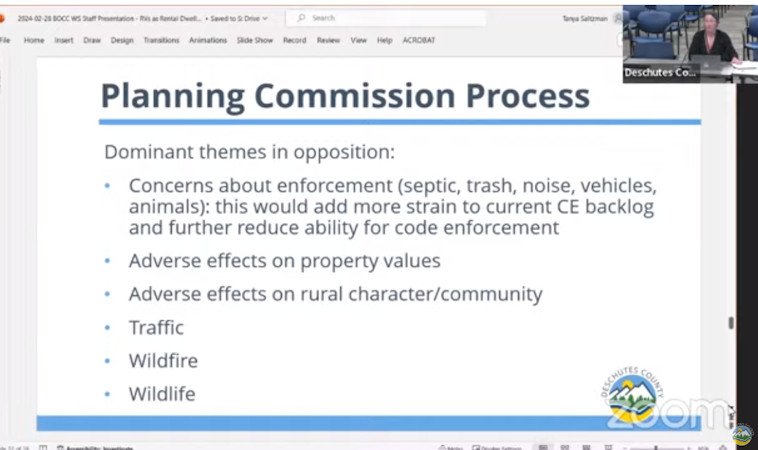Deep, devilish details delay Deschutes decision on allowing long-term RV rentals on rural parcels

Discussion follows new state law that took effect Jan. 1, allowing - but not requiring - counties to act
BEND, Ore. (KTVZ) – Just about everyone in Central Oregon would say they welcome more affordable housing options, large and small, rural or urban – that’s practically a given these days.
But the very devilish details when you get down to specifics were once again on grand display Wednesday morning. Deschutes County commissioners took up a new state law that as of Jan. 1 allows - but does not require - counties to establish rules and a process, allowing rural residential residents to rent out one RV on their property – with all the rules and requirements one might expect.
The county Planning Commission weighed the idea months ago, including a public hearing and citizen testimony, then in the end voted 4-3 to recommend the county not adopt the amendments to their land-use laws to allow rural RV rentals. It’s that divisive an issue, with plenty of pros, cons and unknowns.
That said, it might not surprise anyone that commissioners spent some time weighing those issues Wednesday, and in the end asked staff to come back with more information and answers before they decide whether to proceed to a formal proposal, public hearing and potential adoption.
Commissioner Phil Chang noted the legislation was passed at Clackamas County’s request, but as far as who’s stepping up to make it happen, Senior Planner Tanya Saltzman said, “Word on the street is we are No. 1.” (Commissioners would have really liked to see how it worked elsewhere first.)
The limitations and requirements are sizable. For example, they only would be allowed in “rural exception” zones, such as RR-10 and MUA-10 (rural residential and multiple-use agriculture, with 10-acre minimum lot sizes), with no land in the cities’ “urban reserve” areas.
In her memo to commissioners, Saltzman noted there are some similarities to the recent work that led to new county rules allowing rural accessory dwelling units (ADUs) - but they're not RVs, which are quite different vehicles, not structures.
As the draft rules state, the RVs must have a Department of Transportation title, they must be hooked into sewer, water, electrical and drainage systems, and have a toilet and sink. And they can’t be a short-term rental -- only long-term.
Even with that, the estimate is that some 12,400 rural properties in Deschutes County could be eligible to have an RV rental dwelling. Another 3,000 could meet the requirements – except there is no house now on the property, as it required.
Then there are ramadas - no, not a stay the Ramada Inn, but a sturdy roof with poles over an RV that can better handle heavy snow loads than their roof. In her memo to commissioners, Saltzman said staff didn't include it as a recommended requirement, but in retrospect, they should have.
Community Development Director Peter Gutowsky said that’s because “RVs are not designed to be permanent dwellings.”
But on the other hand, Chang noted, there are RV parks around the area where “people are tending to them, making sure the roofs don’t collapse on their own.” But on the other other hand … tourists on an RV trip aren’t full-time residents.
Ramadas weren’t required when rules were adopted to allow long-term RV residents in cases of medical hardship. As Gutowsky noted, among Oregon's most popular tourist spots, Deschutes is “one of the few counties that see this kind of winter conditions.”
Also discussed, another possible benefit: It’s well-known there are illegal RV dwellings around the county, and a backlog of work for code enforcement officers makes enforcement a challenge already. This could conceivably allow some, if not many, to finally come into legal compliance.
“The opportunity to bring these housing units out of the shadows is not a trivial” matter, Chang said, as they weigh whether to proceed.
Saltzman said the issues raised before and by the Planning Commission ranged from the land-use impact, with potentially thousands of new rural RV dwellings, and the unfunded, added responsibilities for fire districts. Since RVs are not considered “real property,” unlike homes they don’t pay property taxes.
There would also need to be septic site evaluations, to see if they can handle more residents. But since exclusive farm and forest zones are not included in the potential RV rental allowance, the impact is somewhat limited.
Still, as for CDD staff, Gutowsky told commissioners that even now, “We can barely staff the lobby,” and managers step in to do what’s needed. Chang noted that application and permit fees could help cover the costs, but not for all the questions that would come the department’s way.
Commissioner Tony DeBone said he supports requiring a ramada, for example but noted that the south county already has serious issues with nitrate contamination. Colleague Patti Adair, recalling a recent deep-dive discussion with DEQ, said even the best septic systems available here now are only 70% effective in controlling the nitrate issue.
Saltzman told DeBone that any permanent improvements to the property could potentially bring more property taxes.
Chang said it could also help with farmworker housing, as someone could live in an RV dwelling and work on a nearby farm.
He said the state legislation allowing rural RV rentals “is a really important opportunity to address critical housing needs in our community.” He said he’s in favor of holding a hearing, and not withdrawing or postponing the matter.
But Adair said, “I could wait a while to have this come back. … I realize we have a housing issue, but I’m not quite sure this is going to address (it).”
